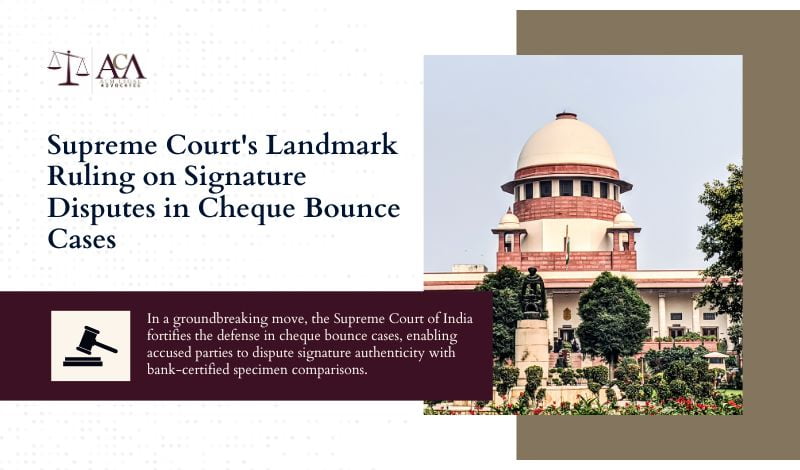The Supreme Court of India has significantly enhanced the defence avenues for individuals accused under Section 138 of the Negotiable Instruments Act. The Court, in the case titled, “Ajitsinh Chehuji Rathod v. State of Gujarat and another” has allowed accused parties to challenge the authenticity of cheque signatures by procuring certified copies of their specimen signatures from banks.
Empowering the Accused with Specimen Signature Comparison
Highlighting a procedural breakthrough, the Court stated that a “Certified copy of a document issued by a Bank is itself admissible under the Bankers’ Books Evidence Act, 1891 without any formal proof thereof. Hence, in an appropriate case, the certified copy of the specimen signature maintained by the Bank can be procured with a request to the Court to compare the same with the signature appearing on the cheque by exercising powers under Section 73 of the Indian Evidence Act, 1872“. This facility aims to provide a solid foundation for disputing signature authenticity effectively.
The Legal Framework and Procedural Context
This judgment underscores a vital aspect of the legal framework governing financial transactions and the handling of disputes over negotiable instruments. By allowing the accused to summon banking records for signature verification, the Supreme Court has addressed a crucial gap in the adjudication of cheque dishonour cases. This enhances the procedural fairness and ensures that the accused can mount a meaningful defence based on factual evidence rather than being constrained by the lack of access to such critical information.
The Supreme Court’s directive has far-reaching implications for legal practice and the operational protocols of banking institutions. It necessitates a closer collaboration between the legal system and banking sector to facilitate the smooth execution of these judicial guidelines. Moreover, this decision could potentially lead to a refinement in the way banks handle and store specimen signatures, given their increased legal significance in cheque dishonour disputes.
Case Analysis: Ajitsinh Chehuji Rathod v. State of Gujarat
In the case titled Ajitsinh Chehuji Rathod v. State of Gujarat and another, the Supreme Court’s bench comprising Justices BR Gavai and Sandeep Mehta dealt with an appeal challenging the High Court’s refusal to accept additional evidence under Section 391 of the Code of Criminal Procedure 1973 in a cheque dishonour conviction. The judgment articulated that, “if at all, the appellant was desirous of proving that the signatures as appearing on the cheque issued from his account were not genuine, then he could have procured a certified copy of his specimen signatures from the Bank.” This observation highlights the Court’s stance on the necessity for the accused to utilize available banking records and procedural mechanisms to challenge signature authenticity effectively. The ruling emphasized the procedural avenues available for presenting a defence based on signature authenticity, underlining the accused’s responsibility to challenge the signature’s genuineness during the trial phase. The judgment emphasized that cheque endorsements come with a “presumption of genuineness as per Section 118(e) of the Negotiable Instruments Act“. It becomes “incumbent upon the accused to lead evidence to rebut” this presumption, a pivotal aspect that necessitates proactive defence measures. By emphasizing the necessity to utilize banking records and procedural mechanisms proactively, the ruling offers a blueprint for accused individuals to follow when disputing the genuineness of a cheque’s signature.
Conclusion
This Supreme Court directive solidifies the legal framework for addressing disputes over cheque signatures, emphasizing the critical role of banking evidence in establishing a defence. It marks a significant step towards ensuring that the accused in cheque dishonour cases have a fair opportunity to present their case, thereby upholding the principles of justice and equity. The judgment not only reinforces the legal rights of individuals but also sets a precedent for future cases, ensuring comprehensive procedural guidance in the adjudication of cheque bounce disputes.






